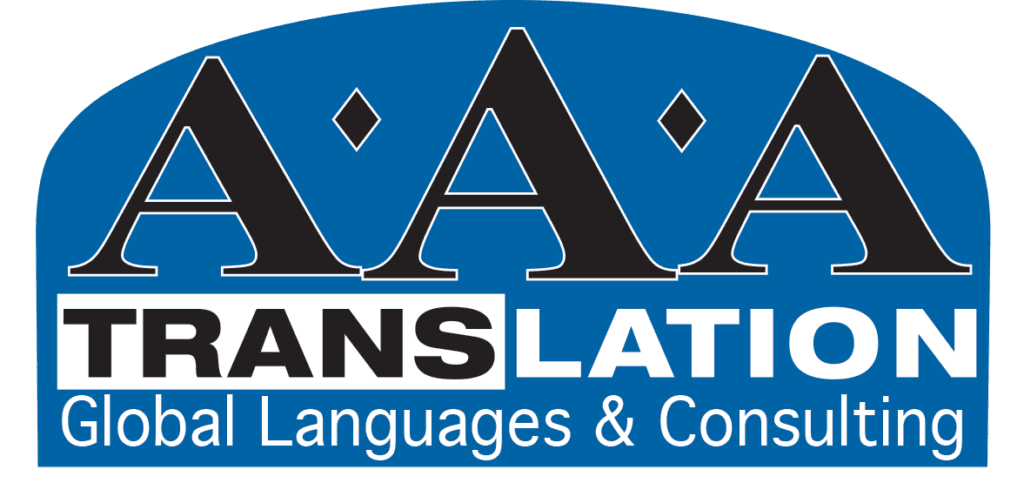By AAA Translation – www.AAATranslation.com
More than a century ago, the advent of commercial air travel gave us the ability to be physically and emotionally present with others far away. Now, the dawn of the Information Age has given us access to global communication without leaving our offices and homes. With every passing age and innovation, our world becomes more globalized. Many modern challenges —and solutions—impact how we communicate on a global scale. During Covid-19, people have become more aware than ever of our interconnectedness and the need to quickly disseminate information from one culture to another.
English has been extolled as the lingua franca of the business world, but it is dangerous to assume that this one language will give your leaders all they need to successfully navigate international business. Out of the world’s approximately 7.5 billion inhabitants, 1.5 billion speak English. That’s about 20% of the Earth’s population, and it’s important to remember that most of those people aren’t native English speakers. The ability to communicate at the speed of the market is what sets businesses apart from their competitors and prevents language barriers from becoming business barriers.
It’s about so much more than a simple rote translation; context and cultural awareness have become key players in modern businessand understanding how to communicate is just as important as what is said.
Overcoming Language Barriers to Recovery and Expansion
As the world emerges from the pandemic, the face of business will have changed forever. One of the most critical lessons to internalize and integrate into your business is that of a language enhancement strategy.
Language barriers can have tangible, negative effects on business.A report from the Economist Intelligence Unit suggests that more than 64% of executives admit that misunderstandings have halted international business deals. These “messages lost in translation” can become the primary reason that companies fail to grow and hesitate to expand their business internationally. In many cases, this goes beyond the simple translation of the message and loses meaning due to a lack of emotional connectivity. Translating words is one thing, but properly emoting those words is a whole other issue.
Differing cultures assign different words to a variety of emotions, and the words to express an emotion may not be found in every language. Furthermore, the word connected to a certain emotion may have a slightly different understanding depending on cultural context. For example, the Persian language uses the word-form ænduh as an expression of two concepts, ‘grief’ and ‘regret,’ but the Sirkhi vernacular of Dargwa uses the word-form dard as an expression of both ‘grief’ and ‘anxiety.’ A Persian speaker may understand ‘grief’ as an emotion that is more like ‘regret,’ but the Dargwa speakers may comprehend ‘grief’ as more like ‘anxiety.’ This example shoes how different words have diverse and nuanced meanings, implying different associations with emotional states – a difficult cultural barrier to overcome without translation that considers both content and context.
Broadening Understandings of Communication
Taking a proactive approach to savvy business communication is about much more than translating words from one language to another. Consider all the ways you are communicating with potential partners, customers, and allies. The signage on and in your building may be the first thing your visitors notice. This represents an early opportunity to make them feel welcome, and will set the tone for their visit. Every interaction represents an opportunity to build trust, and their opinion of your company will travel back to the office with them and be shared with others.
Reports and presentations simply run through a basic machine translation tool will lack cultural nuance; context is equally as important as content.Effective leaders must understand that they are communicating before they have begun speaking or shared even the first written words. Understanding the emotions being portrayed through the translation and interpretation of the language plays a large part in effective communication. Because of this, it is imperative to not only communicate clearly, but also to invest time in understanding the counterpart’s culture and tradition.Take the time to read the room, gauge your audience, and consider your body language, delivery, and assumptions. Better yet, consult an expert on what to consider when conducting business with people from cultures unfamiliar to you.
Proactive Approaches to Inclusion
In addition to mastering delivery, companies that use technology to promote involvement can gain a competitive edge. Offering multiple languages within applications and setting meetings times with respect to zones goes a long way toward positive interactions, mutual respect, and brand affinity. By accommodating all participants, companies become more approachable, and therefore preferred, partners.
Similarly, having a multilingual workforce has been proven to be a success factor in globally expanding and thriving companies. A study from Forbes Insightsreports that “businesses with multilingual teams reported seeing a positive impact across various areas, such as improved reputation within specific geographic markets and on a global scale. Employees also reap the benefits of language proficiency with improved performance, confidence and increased engagement at work.” Furthermore, those global employees appreciate receiving internal communication in their native languages.
Creating a diverse workforce shows a commitment to inclusion that “walks the talk.” When your customers or clients are able to communicate with an employee who speaks their language and understands cultural subtleties, your company gains credibility that speaks volumes.
Compliance Considerations
Companies must ensure that their contracts, operating manuals, and other important documents are translated precisely. It is imperative that these documents are updated when appropriate and reviewed for accuracy as a business expands outside its domestic market. This becomes even more critical in the field of healthcare, as patients must be able to understand the treatments and procedures to which they are consenting.In the manufacturing world, a manual that is translated or interpreted incorrectly can easily become a safety issue. In most European countries, it is required by law to provide operation/safety manuals in the native language, otherwise equipment and products may get stuck in customs. Working with a proficient translator who has experience in pertinent situations will prove invaluable.
Another area that can be critically impacted by context is legal compliance. In order to be legally compliant, you may need an overhaul of your legal documents, such as contracts, to ensure they are translated correctly. Your language advisor/translator should also be verified in these situations.
The Path to Growth
In an era when real-time translation and interpreting via mobile devices are beginning to make their way into our lives, it is more important than ever to remember the importance of context. Take time to assess your company’s current approach to communicating, especially the ways in which you convey messages with the majority of the world whose first language is not English. Companies that seek to thrive globally must embrace new strategies for communication and make real strides toward inclusivity and understanding of multicultural issues.
Susanne Evens, Founder & CEO – AAA Translation
President, St. Louis – Stuttgart Sister Cities
+ 1 (636) 530-1010 – Toll free (844) 293-3519
sevens@aaatranslation.com
www.AAATranslation.com
A Certified Missouri Woman-owned Business Enterprise – WBEA Certified St. Louis Airport Authority (SLAA) Woman-owned Business Enterprise – WBE

Susanne Evens, a German expatriate, is the founder and CEO of St. Louis-based AAA Translation (established in 2005).

Education:
- Business Degree from the Business School in Aalen, Germany
- Degree as a Foreign Language Correspondent from the Business College Merkur in Ulm, Germany
- Studied five languages: English, French, Italian, Russian and Spanish
Volunteer Work:
- President St. Louis – Stuttgart Sister Cities since 2006
- Treasurer of the Missouri Humanities Council
- Board Member of the World Trade Center St. Louis
- Board Member German American Heritage Society
- Board Member German American Committee
- AAA Translation is a St. Louis Mosaic Silver Ambassador Company
- Currently mentoring two professionals new to St. Louis from Brazil and Germany via the St. Louis Mosaic Professional Mentoring Program and one emerging entrepreneur via the St. Louis Regional Business Council
https://stlpartnership.com/susanne-evens-shares-story-on-helping-to-strengthen-the-st-louis-immigrant-community/
Awards:
2013: German American Heritage Society of Saint Louis, Friedrich Hecker Freedom Award
2016: Top 100 St. Louisans to Know to Succeed in Business Small Business Monthly 2017: Immigrant Entrepreneur and Sister Cities Award, St. Louis Mosaic Project
